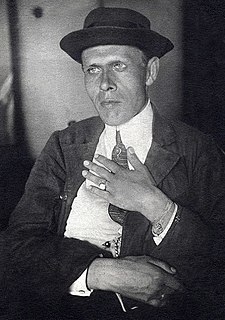A Quote by Paulo Coelho
I only can write a book every two years, you know. And I write very fast, but I'm not always writing every day. I needed a contact with different things, like nature, for example. I cannot be in front of a computer trying to tell a story.
Related Quotes
The secret to writing is just to write. Write every day. Never stop writing. Write on every surface you see; write on people on the street. When the cops come to arrest you, write on the cops. Write on the police car. Write on the judge. I'm in jail forever now, and the prison cell walls are completely covered with my writing, and I keep writing on the writing I wrote. That's my method.
The secret to writing is writing. Lots of people I know talk about writing. They will tell me about the book they are going to write, or are thinking about writing, or may write some day in the future. And I know they will never do it. If someone is serious about writing, then they will sit down every day and put some words down on paper.
The process for writing a picture book is completely different from the process of writing a chapter book or novel. For one thing, most of my picture books rhyme. Also, when I write a picture book I'm always thinking about the role the pictures will play in the telling of the story. It can take me several months to write a picture book, but it takes me several years to write a novel.
I take pens and I write on the inside of my arm. When I'm with people and somebody says a really fascinating anecdote, or fact, or phrase, I'll write it on the inside of my arm. At the end of the day, I'll take the very best things that are on my arm and I'll copy them into a notebook that I always carry and only when the weather is absolutely terrible will I really key the very best of that notebook into the computer. At that point, it's all sort of censored twice - only the best things go from the arm to the book and only the best things go from the book to the computer.
There isn't a single day I don't do some writing -- if you don't, you won't have a book. When you're self-employed it is very easy to burn away your time instead -- answering e-mails, surfing the Internet, or hanging out with friends. You really must have the discipline to sit down and write every day. Most of what I am writing is living in the back of my head or in my subconscious. I find if I write every day, my subconscious will do the job for me.
Go where the pleasure is in your writing. Go where the pain is. Write the book you would like to read. Write the book you have been trying to find but have not found. But write. And remember, there are no rules for our profession. Ignore rules. Ignore what I say here if it doesn't help you. Do it your own way. Every writer knows fear and discouragement. Just write.The world is crying for new writing. It is crying for fresh and original voices and new characters and new stories. If you won't write the classics of tomorrow, well, we will not have any.
Well, first you have to love writing. A lot of authors love having written. But I enjoy the actual writing. Beside that, I think the main reason I can be so prolific is the huge amount of planning I do before I start to write. I do a very complete, chapter-by-chapter outline of every book I write. When I sit down to write, I already know everything that's going to happen in the book. This means I've done all the important thinking, and I can relax and enjoy the writing. I could never write so many books if I didn't outline them first.
I myself, as I'm writing, don't know who did it. The readers and I are on the same ground. When I start to write a story, I don't know the conclusion at all and I don't know what's going to happen next. If there is a murder case as the first thing, I don't know who the killer is. I write the book because I would like to find out. If I know who the killer is, there's no purpose to writing the story.
I used to think that if I was ever so lucky as to get a book deal that I would write all the time. All day, every day. I'd write three books a year. The truth, though, is that writing all day isn't really feasible. I could do it, but I'd be folding in on a lot of other aspects of my life, things I care about. And I wouldn't be happy.
It's funny - for a long time, I didn't know I was writing a book. I was writing stories. For me, each story took so long and took so much out of me, that when I finished it, I was like, Oh my gosh, I feel like I've poured everything from myself into this, and then I'd get depressed for a week. And then once I was ready to write a new story, I would want to write about something that was completely different, so I would search for a totally different character with a different set of circumstances.




































